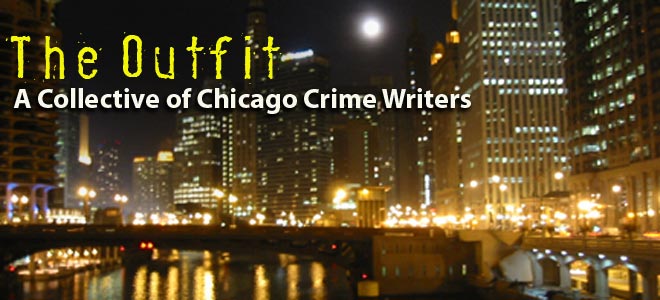
Sam Reaves, aka Allen Salter, is, quite simply, one of the best crime fiction authors in Chicago. I’ve been reading him since his Cooper MacLeish series,and continued with his Dominic Martell and Dooley books-- he just keeps getting better. I love his prose. His plots and his characters aren't half bad, either. His tenth novel will be out soon, and I'm thrilled he's stopping by The Outfit to talk about it… and more. Both he and I will be around to check comments, so feel free to post. Welcome, Sam!
Some books are easy to write, others are tough. Sometimes a book just fights you from beginning to end; sometimes you start out like a house afire and get bogged down in the middle; sometimes you careen along having fun with the story and then when it’s time to wrap things up you realize you have so much going on you’re going to have the devil of a time making it all come out right, with no loose ends dangling.

Most of mine seem to be tough. Looking back, the easy ones stand out: Fear Will Do It practically wrote itself; Dooley’s Back took eight months from conception to completion, the fastest I’ve ever done a book. Homicide 69 was a lot of work from a research point of view but the writing mostly went pretty well, and I had a great police consultant, the late John DiMaggio, looking over my shoulder. But both Bury It Deep and Get What’s Coming gave me fits. I was struggling with the awkward nature of the Cooper series (essentially an amateur sleuth but stylistically closer to a P.I.) and having trouble getting a handle on the stories. I have bad memories of those books, though I think they came out all right.
Under my Dominic Martell pseudonym, Lying Crying Dying and The Republic of Night went well, making me think I had it down, and then Gitana twisted totally out of my control and wound up being the toughest to finish of all my novels.
Mean Town Blues was one of the easy ones. The premise is simple: we’ve all heard about a woman being persecuted by a stalker and thought, “Somebody ought to just shoot the son of a bitch.” (Admit it, you’ve thought that.) Well, what if you did? And what if when you did, you found out that you’d killed somebody with some very heavy connections? You’d need to be a fairly steady hand yourself to deal with the consequences. And there’s my novel. Tommy McLain, a Kentucky boy just back from a rough tour in Iraq, finds out that Chicago can be a mean town indeed.
Basically I just wound up the story and let it run. And because I knew who Tommy was, knew where he came from and what had forged him and how he thought and talked and reacted, the book pretty much wrote itself.
I wish I could figure out what I’m doing right on the easy ones, so I could do it every time. If I’ve learned anything, it boils down to keep it simple, find the right voice and take care of the prose.
I hope I can remember that when I start my next book.
Sam
PS You can celebrate Mean Town Blues with Sam at his launch at Sheffields on Wednesday, November 12 between 7 and 10 pm; 3258 N Sheffield, Chicago.














